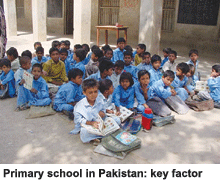 Pakistan is a volatile country in a turbulent part of the world. Its nuclear weapons have been passed, like batons in a relay race, from military dictator to civilian despot and back again. Now, education could be the key factor standing between Pakistan and nuclear annihilation, believes the current administration. So the government, which came to power following a controversial and violent election, has called in a leading British educationist to help transform Pakistan’s schools.
Pakistan is a volatile country in a turbulent part of the world. Its nuclear weapons have been passed, like batons in a relay race, from military dictator to civilian despot and back again. Now, education could be the key factor standing between Pakistan and nuclear annihilation, believes the current administration. So the government, which came to power following a controversial and violent election, has called in a leading British educationist to help transform Pakistan’s schools.
In end February Sir Michael Barber, former head of the School Standards and Effectiveness Unit, was announced joint chair of a Pakistani education taskforce designed to implement large-scale changes to the country’s school system. “If the education system fails for another 10 or 20 years, we could see it going on a huge downward spiral. I don’t think I need to elaborate on the problems there. But an educated Pakistan could be a thriving democracy. It could see economic growth comparable to China or India,” says Barber.
Pakistan ranks 163rd in the United Nations’ index of 177 countries’ schools. Only 62 percent of primary-age children attend school; half the adult population is illiterate. In August last year, the Pakistan government rewrote its national education policy. The aim of Sir Michael’s taskforce will be to oversee its implementation. Many of the policies will be familiar to him. Key among them is an emphasis on establishing national standards in maths, Urdu, science and English. Punjab, the most populous province, already has a public exam system in place, and this could be extended across the country.
There is also an emphasis on parent power. Parents will be given clear definitions of what a good school should provide. “We want a big promotional campaign,” says Barber. “Parents and communities should be clamouring for good education, and complaining if they’re not getting it.”
And public-private partnerships will augment the state system. A not-for-profit organisation in Punjab already secures state funding for poor children to attend fee-paying schools. However, half the schools lack basic facilities such as toilets, tables and chairs, or outside walls. And leaders in certain areas retain conservative attitudes to girls’ education.
But Barber insists that, treated with sensitivity, such prejudices can change. He also hopes to ensure that funding is not misspent, or diverted into leaders’ pockets.
“Pakistan is the single biggest education reform challenge on the planet. But it’s really important that this reform is Pakistan’s reform, by Pakistanis for Pakistanis. It’s not about me. It’s about how I can help them,” says Barber.
(Excerpted and adapted from Times Higher Education)